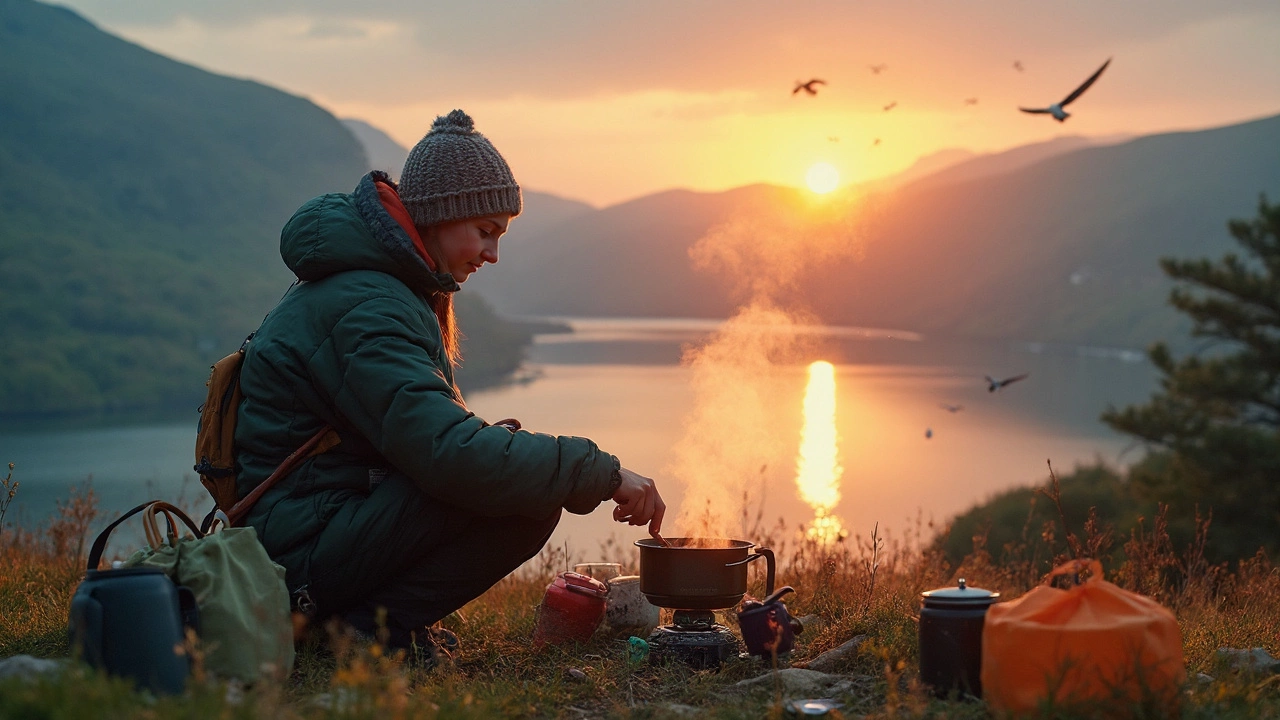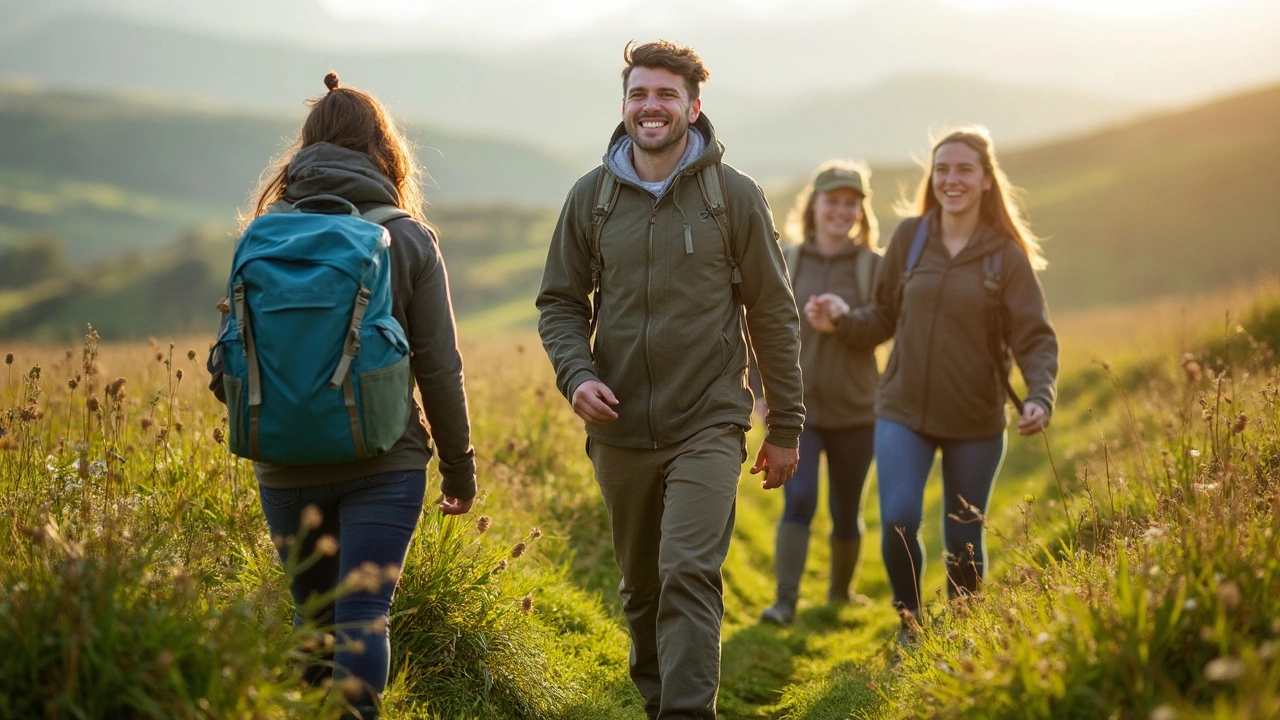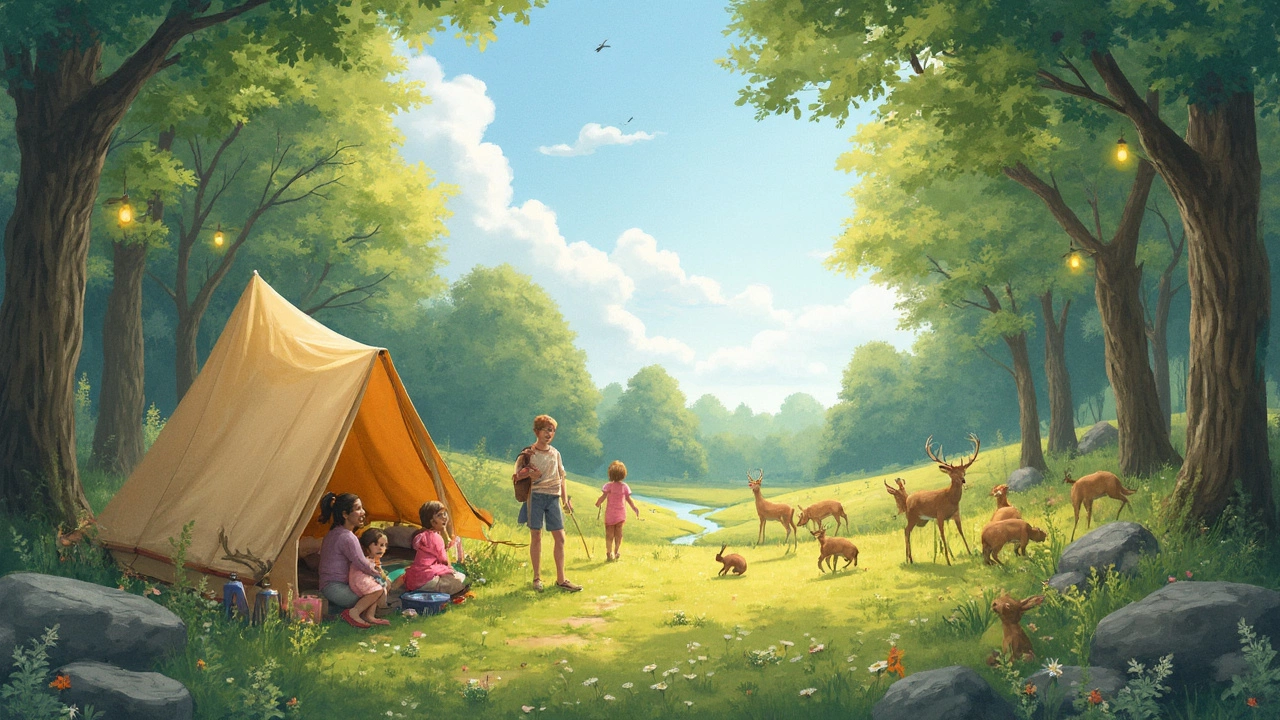Camping's pretty much like hitting the reset button on life, isn't it? Surrounded by nature, everything feels fresher, lighter, and more real. But here's a thought—how do we keep that nature exactly the way it is, lush and unspoiled? That's where the golden rule comes in: keeping it green and simple.
Think about your footprint. Not the one in the sand, but your environmental footprint. It's all about making sure we leave the campsite as we found it. And it's easier than you might think—just a couple of simple swaps and habits can make a world of difference.
Next up is picking the right spot. It’s not just about the view or how close it is to the lake. It’s about choosing places that allow camping and don’t harm the ecosystem. By being mindful of where we pitch our tents, we help preserve the natural beauty of these places for future campers.
- Understanding Eco-Friendly Camping
- Picking the Right Spot
- Sustainable Camping Gear
- Respecting Nature and Wildlife
- The Joy of Simplifying Your Camping Experience
Understanding Eco-Friendly Camping
Eco-friendly camping is all about enjoying the great outdoors without leaving a mark on Mother Nature. It means taking the time to think about how your camping habits impact the environment and making smarter choices. From selecting the right gear to practicing good camp ethics, it’s all about protecting the places we love.
One key aspect of eco-friendly camping is the idea of 'Leave No Trace.' Have you ever heard of it? It's about leaving campsites exactly as you found them. This means packing out all trash, being mindful of campfires, and sticking to trails to prevent erosion.
- Use reusable items: Ditch the disposable stuff. Bring your own reusable water bottles, cutlery, and food containers.
- Choose gear wisely: Look for camping equipment made from sustainable or recycled materials. It's kinder to the planet.
- Mind water use: Be sparing with water, especially in areas with little supply. And always use biodegradable soap.
- Be wildlife-aware: Store food securely and never feed the animals. Keeps both you and them safe.
Numbers help paint the picture. Consider that in certain parks, unattended fires contribute to over 60% of wildfires. By being careful with fire and following rules, we can all help lower that risk.
| Impact | Action |
|---|---|
| Trash | Pack it in, pack it out |
| Water Supply | Use sparingly, biodegradable soap only |
| Wildlife | Keep a safe distance, secure food |
So, when you're planning your next adventure, remember that being eco-friendly isn't just trendy—it's the best way to make sure these spectacular places stay postcard-perfect for everyone. What's your top tip for keeping camping green? Let’s all swap ideas and keep the chatter going!
Picking the Right Spot
When it comes to camping, location matters. Picking the right spot isn't just about snagging a killer view or being close to the bathroom. It’s about finding that sweet spot where you can enjoy nature while keeping it intact. The key? Go for areas designated for camping to ensure you're not trampling a delicate ecosystem.
These designated spots are usually equipped with facilities to manage waste and amenities, minimizing your environmental impact. Before setting up, check if you need permits. This isn't just a formality—it helps control the number of visitors and keeps the area from being overwhelmed.
If you're venturing into the wild, follow the 'Leave No Trace' principles. Set up at least 200 feet away from lakes and streams to protect those precious water sources. Choose durable surfaces like rock, gravel, or dry grass to preserve the environment. Here's a quick checklist to help:
- Research locations and ensure camping is allowed.
- Check for any regulations or permits required.
- Set up on previously used sites to reduce impact.
- Stay at least 200 feet from water sources.
- Dispose of waste properly in designated areas.
These little steps can make a big impact. Plus, you’ll have peace of mind knowing you're doing your part to keep these beautiful places pristine for everyone who comes after you. And that, my friend, is what makes camping in the wild truly special.

Sustainable Camping Gear
Alright, let's chat about sustainable camping gear. Now, you might be thinking, "Do I really need fancy stuff?" Nope, but making eco-friendly choices can go a long way. It's about gear that's not only kind to the earth but also super functional.
First things first, let's talk tents. Picking one that's made of recycled materials is a solid start. Brands nowadays are really stepping up their game, using old plastic bottles and transforming them into durable tents. How cool is that?
Sleeping bags are another area to consider. Look for those with natural fillings like wool or down, as they tend to have a lower impact compared to synthetic ones. Plus, they often provide better insulation.
Cooking while camping? Ditch the disposable stuff. Invest in a set of reusable plates, cups, and cutlery. These will not only help reduce waste but also save you money in the long run. You know how it's all about those small, smart choices.
And let's not forget solar-powered gadgets. From chargers to lanterns, harnessing the sun's power is both eco-friendly and practical, especially when you're out in the wild.
Here's a quick list of top sustainable gear to look out for:
- Recycled Material Tents: Durable and eco-conscious.
- Natural-Filled Sleeping Bags: Less synthetic, more comfort.
- Reusable Dishware: Say bye to single-use plastics.
- Solar-Powered Lanterns: Light up your campsite without a carbon footprint.
By choosing gear that respects nature, you'll align your adventures with the eco-friendly spirit. These small changes can make a huge difference, turning your camping trips into ones that give back to our planet.
Respecting Nature and Wildlife
When you’re out camping, especially in an eco-friendly style, showing respect for nature and wildlife isn't just a nice idea—it's an essential part of the experience. It’s not just about not littering, even though that’s super important, but it also means being aware of how your actions might affect the creatures and plants around you.
First up, let's talk about keeping your distance. It might be tempting to get a closer look at a squirrel or snap a selfie with that curious deer. But wildlife needs space. Getting too close can stress them out and mess with their natural behavior. Bring binoculars—they're a great way to observe animals without intruding.
Then there’s the issue of food. Feeding wildlife is a big no-no. It changes their diets (and not in a good way) and makes them dependent on humans. Plus, leaving food out can attract unwanted visitors, like bears. Keep your food secure in airtight containers and hang it up if necessary.
- Stick to trail paths: Going off-path can damage delicate habitats and disturb wildlife.
- Lower the noise: Nature’s break from the urban hustle. Loud noises scare animals and can ruin the vibe for other campers.
- Leave no trace: Pack everything you brought with you, including trash, food scraps, and even biodegradable waste.
Remember, what you do has a broader impact on the ecosystem. The animals, plants, and even the soil all have roles to play. Your mission as a conscientious camper is to blend in quietly and let nature do its thing, ensuring your camping adventure doesn’t just entertain you, but protects the environment for others too.

The Joy of Simplifying Your Camping Experience
Camping doesn't need to be a full-blown production with heaps of gear and bags overflowing with stuff you might not even use. Simplifying your camping experience can actually bring more joy and ease to your adventure.
First off, think of it as a chance to unplug. Do you really need all that tech out in the wild? Ditching electronics not only lightens your load but truly lets you soak in the surroundings and connect face-to-face with your fellow campers. It's about living in the moment.
When it comes to gear, focus on multi-purpose items. Why not use a tarp that can serve as a groundsheet during the day and a makeshift shelter at night? This kind of dual-functioning gear means less to carry and more space to enjoy.
Food's another area where less can be more. Rather than trying to whip up a gourmet meal, stick to simple, tasty recipes you can prep quickly. Think one-pot dishes or foil-wrapped goodies that save time and cut down on cleaning.
By simplifying your gear and activities, not only do you reduce your environmental impact, but you also enhance the authentic camping experience. You’re there to enjoy nature, not to replicate your entire home in a tent. Strip it back, and you'll find that freedom and peace are really the ultimate takeaways.
In fact, a 2024 survey suggested that campers with minimal gear often report higher satisfaction. Let's have a look:
| Year | Number of Items | Satisfaction Level |
|---|---|---|
| 2023 | 15+ | 70% |
| 2024 | <10 | 85% |
Looks like keeping it simple not only saves the planet but boosts the fun too!
